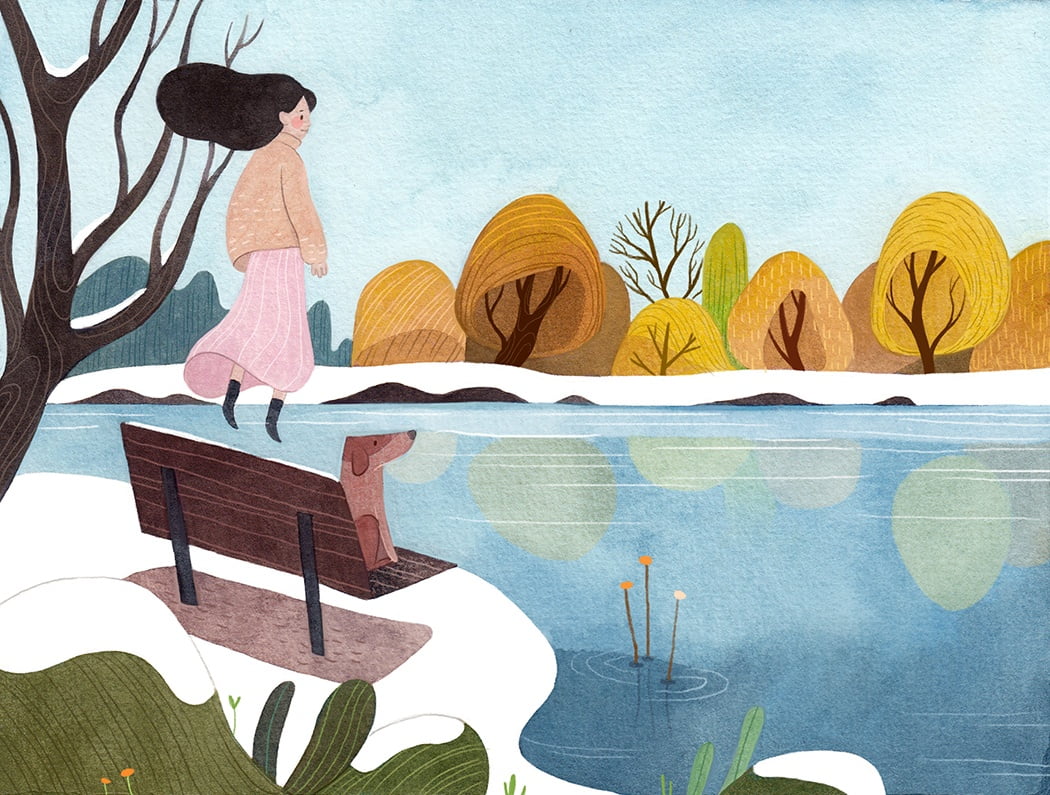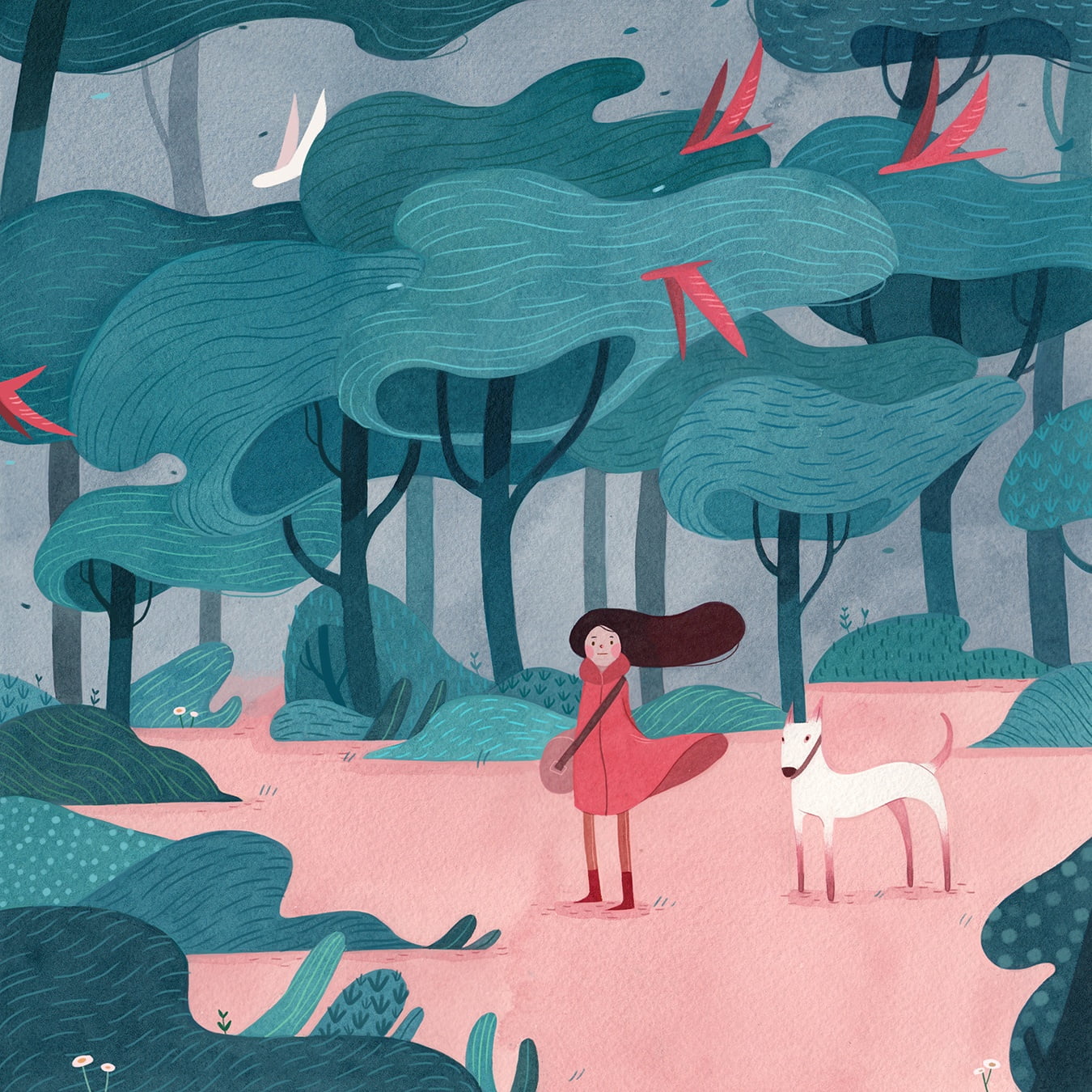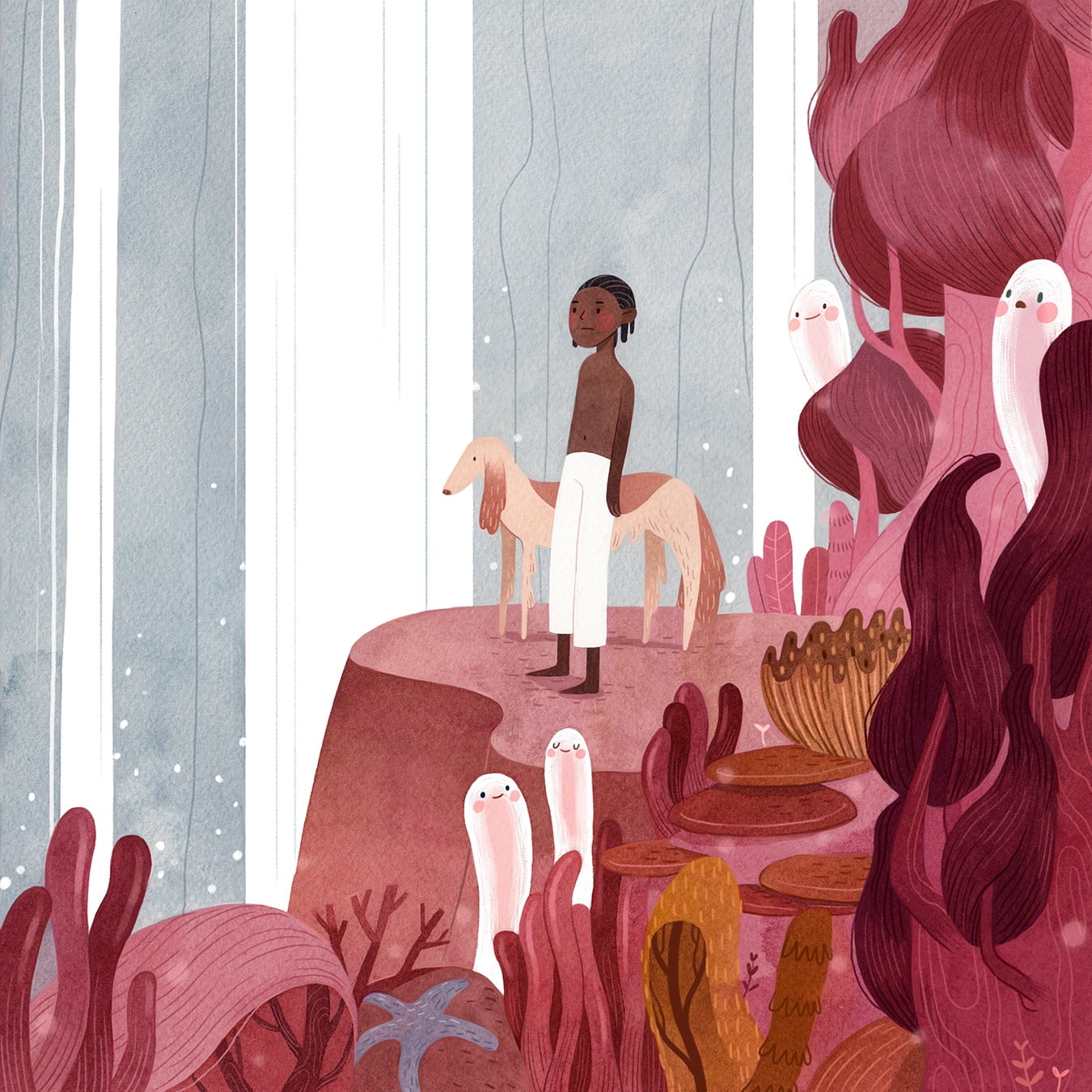Vivian Mineker is a Taiwanese American Freelance Illustrator from Taipei and Portland, currently working and living in Ljubljana, Slovenia. This is an exclusive interview with Toons Mag.
Arifur Rahman: Vivian, Welcome to Toons Mag! I have seen lots of wonderful illustrations on your website and Instagram, it was just fantastic. I am sure, many other people are also excited to know about you. First of all, I want to ask you, “How would you describe yourself?”
Vivian: My name is Vivian Mineker. I’m a Taiwanese–American freelance illustrator, currently living in Ljubljana, Slovenia. In August this year, I’ll be 34 years old.
Arifur Rahman: Nice to know that! Wishing you an “advance Happy Birthday, Vivian Mineker!”. 🙂
Anyway, What was the first artwork that gave you recognition?
Vivian: I wouldn’t say there was one piece of work that was clearly defined as the “breakout” piece. It was sort of a gradual process of having a series of works that grabbed people’s attention on social media, namely Instagram. It was around May of 2017, I did a series of illustrations of this big-eyed bubblehead girl doing different activities with animals in nature, I think it was cute and relatable to people and my following grew quickly from there.

Arifur Rahman: When did you decide that you want to become an artist/illustrator and why?
Vivian: I’ve known since I can remember that I want to be an artist. I just never grew out of drawing. It’s always been my escape and method of expression. I used to want to be an animator at Disney because I loved all their films. I got a degree in Animation in college but eventually decided I wanted to do illustration instead because the animation industry was becoming too computer-oriented for me. I wanted to draw with my hands, and not with a mouse.
Arifur Rahman: Why should anyone choose this as a Profession?
Vivian: I think if you love drawing and love solving problems with visual elements, creating stories and worlds, this is really a perfect job. It is the way I express my world and my feelings and to be able to get paid doing it, is pretty much a dream come true.
If you love drawing and love solving problems with visual elements, creating stories and worlds, this is really a perfect job. – Vivian Mineker
Arifur Rahman: What is the biggest achievement you think that you earned in your career?
Vivian: I still feel like a beginner who’s trying to “get there”. I’ve had moments of achievements on the way, but nothing crazy yet. I would say that for me, the biggest achievement is just that I’m still in the game! It’s not an easy industry to break into and remain in. I feel proud whenever a project is done in a way that I envisioned and that people like it, enough to keep the work flowing in.
Arifur Rahman: Do you feel that illustration is a work nowadays only being used for commercial purposes?
Vivian: Not necessarily. I mean illustrators need to make money to live, so having the commercial aspect to illustration is not only a plus, it is necessary. But I know plenty of illustrators that create and work on their own projects purely out of love for the craft. I know for myself, I can’t only do client work all the time, I need personal works to keep my creativity alive, to get the juice flowing, so to speak. An illustration is a very versatile and diverse art, so I think it can be applied to many aspects of our lives.
Arifur Rahman: What is the typical daily work plan of an illustrator?
Vivian: It varies for me a lot. Most days I wake up and take it slow in the morning, eat breakfast, walk my dog. Then I sit down and answer emails and get most of the admin stuff done before getting into the real work. Then for the most part of the day, I work on various projects I have at the time, and this is the most diverse and exciting part — I could be doing sketches, gouache works, detailing or finishing digitally. And I enjoy every part of it. I work until about dinner time, relax a bit, take another walk, then get back into it if necessary until bedtime.
Arifur Rahman: What sort of new challenges are there for a beginner?
Vivian: The hardest part for me was to find work. I had a portfolio of personal work, but nothing to show professionally yet. So having a project or two to start was the most challenging part. Thankfully a friend of a friend commissioned me to help him illustrate two children’s books that he had written, and that really got the ball rolling. I worked very hard on these two books, then when they’re published, I was able to show potential clients what I could do. It still wasn’t easy getting them in front of the right eyeballs, but with persistence, it eventually got me more projects, which in turn further enriched my portfolio.
Arifur Rahman: Do you feel that represent the working environment has become more competitive for an illustrator?
Vivian: I am not sure that it has become more competitive, I think it always has been. For the reasons I mentioned before, being an illustrator is really a dream come true, and a very desired career for many artists, who all compete to get their slice of the pie, but there is only so much work out there. It’s a field where if you’re not constantly improving your skills and keeping up to date on promotion and trend, you’re very quickly overshadowed by all the extremely talented illustrators out there.

Arifur Rahman: New software or applications has made this profession more lucrative. Do you agree?
Vivian: I definitely agree that digital art had greatly improved the productivity of illustrators. Because I work half in traditional medium and half digitally, I can really feel the difference. The traditional part of my work takes so much longer and I have to be much more careful, whereas when I work in Photoshop, I was able to quickly get many things done, and because endless mistakes can be reversed, I am also able to be more bold with my workflow.
Arifur Rahman: New generations are rushing towards money rather than taking it as a passion. What is your view about it?
Vivian: I think that statement is true in many aspects of society, and it is really a shame because it robs us of authenticity. When contents and artworks are created purely to appease the masses, it inevitably loses originality and everything becomes cheapened and confirmed. This also happens in illustration, but I think to a lesser degree, especially in children’s illustration. Because I believe that this is an art that is still created by people that believe in and feel the need for authenticity. After all, it is meant to connect with children, and who is more pure and authentic than them?
Arifur Rahman: Do you feel in the future, illustration or other artworks will be more competitive?
Vivian: Perhaps, as it becomes easier to get into the field. Digital art makes it less intimidating to start creating art. You don’t need to buy a lot of art supplies to start. But in the end, you still have to be good to be competitive, and that means constant training and improvement as well as persistence. So yes, it will be more competitive but if you have the right skills and mindset, you are already one step ahead of many.

Arifur Rahman: What is the main difference between graphic design and illustration?
Vivian: These are two disciplines very much intertwined with one another, with a lot of the same principals applied and goals. In my mind, the biggest difference is that in illustration, I get to develop rich worlds and stories with my drawings, whereas graphic design tends to be more surfaced. I get to explore an idea and tell a story in fantastical ways that only illustrations can convey. I’m not just creating visuals to solve problems, but also to show people the worlds I have envisioned, and invite the viewer to delve deep into the stories I want to tell.
Arifur Rahman: How was your early life as an illustrator and where do you want to see yourself in the upcoming years?
Vivian: I still think that I am in my early years, I still have so much to learn about this field and how to navigate it. So that’s how I see myself going forward, learning as much as I can about the industry, making more connections, get my work out there and have a body of work that I am proud of, and that brings people joy.
Arifur Rahman: Any advice that was helpful in your career?
Vivian: At the beginning of my career, an art director told me to not be afraid of having multiple styles. Because ever since art school, everyone’s been emphasizing the importance of having your own style. While it is important to have a consistent style to sell to clients, you should not hesitate to try different things out. I now have three main styles that I put on my website, and I have gotten work for all of them. It has not limited me but broadens my opportunities to all kinds of different projects. So I’d say, be adventurous and explore all your whims and likes, as long as you’re enjoying it, it will come through in your work.
Arifur Rahman: Thank you, Vivian Mineker! From Toons Mag we wish you good luck and success. We hope all of your dreams come true.
Follow Vivian Mineker on Instagram, or visit Vivian Mineker’s Official Website
Read also: Interview with Turkish Illustrator Afra Elif Kim





